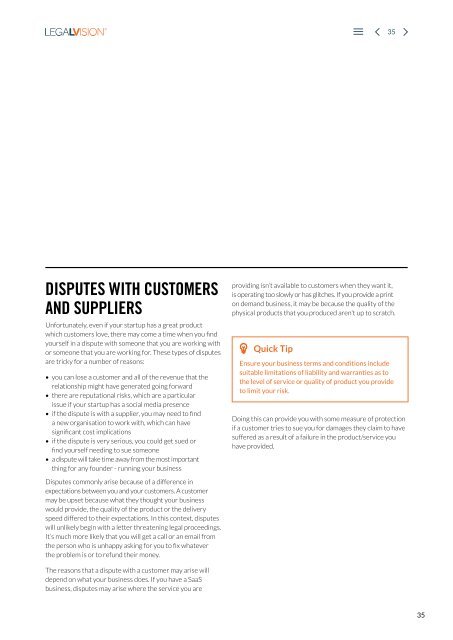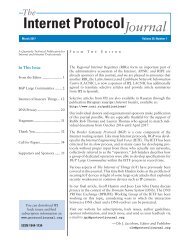Create successful ePaper yourself
Turn your PDF publications into a flip-book with our unique Google optimized e-Paper software.
35<br />
DISPUTES WITH CUSTOMERS<br />
AND SUPPLIERS<br />
Unfortunately, even if your startup has a great product<br />
which customers love, there may come a time when you find<br />
yourself in a dispute with someone that you are working with<br />
or someone that you are working for. These types of disputes<br />
are tricky for a number of reasons:<br />
• you can lose a customer and all of the revenue that the<br />
relationship might have generated going forward<br />
• there are reputational risks, which are a particular<br />
issue if your startup has a social media presence<br />
• if the dispute is with a supplier, you may need to find<br />
a new organisation to work with, which can have<br />
significant cost implications<br />
• if the dispute is very serious, you could get sued or<br />
find yourself needing to sue someone<br />
• a dispute will take time away from the most important<br />
thing for any founder - running your business<br />
Disputes commonly arise because of a difference in<br />
expectations between you and your customers. A customer<br />
may be upset because what they thought your business<br />
would provide, the quality of the product or the delivery<br />
speed differed to their expectations. In this context, disputes<br />
will unlikely begin with a letter threatening legal proceedings.<br />
It’s much more likely that you will get a call or an email from<br />
the person who is unhappy asking for you to fix whatever<br />
the problem is or to refund their money.<br />
providing isn’t available to customers when they want it,<br />
is operating too slowly or has glitches. If you provide a print<br />
on demand business, it may be because the quality of the<br />
physical products that you produced aren't up to scratch.<br />
Quick Tip<br />
Ensure your business terms and conditions include<br />
suitable limitations of liability and warranties as to<br />
the level of service or quality of product you provide<br />
to limit your risk.<br />
Doing this can provide you with some measure of protection<br />
if a customer tries to sue you for damages they claim to have<br />
suffered as a result of a failure in the product/service you<br />
have provided.<br />
The reasons that a dispute with a customer may arise will<br />
depend on what your business does. If you have a SaaS<br />
business, disputes may arise where the service you are<br />
35















